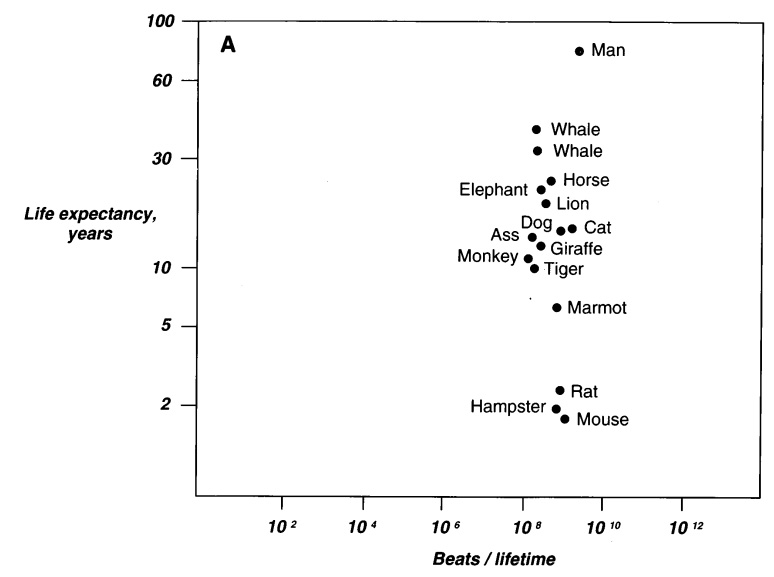Is a lower heart rate better?
.jpg)
There is strong clinical evidence pointing to the correlation between heart rate and longevity.
Here’s an interesting fact - in related longevity research regarding mammals, researchers observed that mice (living 1-2 years on average) had heart rates reaching 500 beats per minute (BPM), whereas animals with longer lifespans such as cats (10-15 years) had heart rates of 150 BPM. In extreme cases of mammals with very slow heart rates such as elephants, turtles, and whales, lifespans could reach 70-170 years.

Chart: Rest Heart Rate and Life Expectancy, JACC Vol.30 No.4
In addition, by adding up heartbeat throughout an animal’s entire lifespan, researchers found that the total was roughly 1 billion beats.

Chart: Rest Heart Rate and Life Expectancy, JACC Vol.30 No.4
One possible way to look at it would be that given a finite number of beats throughout their lifetime, those with a faster heartbeat “used it up” faster. Obviously, there are notable exceptions of species that get more than 1 billion beats! This also isn’t to say that you therefore need to conserve energy and do as little exercise as possible to avoid “prematurely using up your heartbeat”.
Similar results were found in humans as well, though humans in general have a longer lifespan in comparison, though of course it could be argued that this is in large part due to modern medicine. For example, the Copenhagen Male Study followed health outcomes for nearly 3,000 subjects for 16 years, and found that an elevated Resting Heart Rate was a risk factor for mortality.
What is a “good” heart rate when it comes to maximizing longevity, all else being equal?
According to the American Heart Association, Resting Heart Rate between 60-100 BPM is normal. Athletes or physically active people tend to have lower heart rates, down to 40-50 BPM.
It’s important to note that Resting Heart Rate needs to be measured “at rest”. So the measurement you receive after exercise, after drinking coffee, after eating food, after drinking alcohol, after pulling an all-nighter or a variety of behaviors that can temporarily increase heart rate will be inaccurate. The most commonly recommended time to measure is in the morning after waking up!